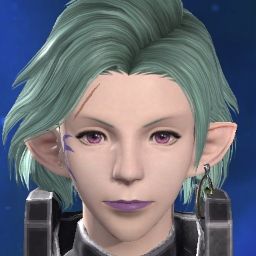Hybrid View
-
02-23-2022 06:18 PM #1Player

- Join Date
- Aug 2013
- Location
- Gridania
- Posts
- 1,347
- Character
- E'renndis Harper
- World
- Moogle
- Main Class
- Fisher Lv 100
(11)
-
02-22-2022 06:30 AM #2
Yet he still doesn't know about meteion. If venat decides to not tell everyone before final days happen because she doesn't want to instigate panic, then after final days has passed and zodiark was summoned, shouldn't it be the best time to tell them? And per elidibus dialogue, it looks like venat faction never seek peaceful option. It was elidibus who wanted reconciliation and was forced to fight hydaelyn.
Like you said before, maybe she want to make sure she's not that weak by the time she had to help us. Or maybe she want to "lessen the pain" (lol).
But nah, the real reason is because it was written way before Endwalker. After all, the writers were forced to retcon her explanation of zodiark from HW by having the Watcher to basically goes "yeah, she kiiiind of lying, but that's because she doesn't want to lose your faith tho".
I mean, we're allowed to disagree with the writer, but fine I'm willing to suspend disbelief for now considering this isn't a thread to discuss the writing itself.
And we saw how effective it was by being vague like that. Death is not natural for them. They don't know what will happen should they choose the "eradicate sorrow" path. They don't even know what this "destruction" means or how it relates to their suffering and the final days.(10)
-
02-22-2022 03:39 PM #3Player

- Join Date
- Feb 2019
- Location
- Ul’dah
- Posts
- 822
- Character
- Eara Grace
- World
- Faerie
- Main Class
- Paladin Lv 100
Yeah, after months of arguing with people who do so in bad faith, I got frustrated and tried to make a snide joke. Sorry.
I’m genuinely baffled you replied with this. Do you seriously believe I insulted the people who liked my posts by pointing out how these conversations turn into toxic?
You can apply to the Sundering in general or any action she would take. “Oh, you’re deliberately trying to do things differently in order to prevent the rejoinings? Oh well, that’s pretty fucked up, after all doing things differently risks creating another doomed timeline and killing all life!”
Was that before or after they formed the Ascian squad and got to work secretly causing calamity’s? Seems like the moment the three Unsundered escaped they got to work.
And never sought a peaceful option? We’re shown her begging them to not sacrifice innocents though?
Her efforts to halt the calamity weakens her though? By the time we show up she’s burned through everything she has, and not just holding back Zodiark either. Not to mention, if she is following the script we laid out then any intervention not mentioned by us to her would be useless and counterproductive.
Ok so where’s the dialogue explaining the retcon for her attempts to stop the calamities? Why double down and have multiple characters talk about her trying to stop them, including her herself if that’s not meant to be true?
You can disagree for sure, but we’re arguing over canon and that inevitably involves authorial intent.
Death and suffering is natural for them though, they were only spared it’s workings for a time, as Venat notes. Erichthonios, Athena, and Hermes are examples of Ancients who faced death in some form before the Final Days.(1)
-
02-22-2022 08:23 AM #4
The Ancients and Meteion plot is a writing nightmare and they never should have wrote it.
(7)
-
02-22-2022 02:02 PM #5
I can see where you're coming from, and at the very end, I also can accept how pre-elpis venat is the same post-Elpis Venat. Sort of. I'm still disappointed though >

If I have to guess, I think my disappointment with the story writing and direction may influence how I see post-Elpis Venat a little bit. Because when I was nearly done with elpis, I was doing it with the mindset that is "multiple timeline is a thing", due to ShB. Imagine my surprise when they decided to have the story as strict closed time-loop. Not only that, it's done with a very poor "yeah your friends got amnesia, and the other person who knows about it decided to keep quiet about it because reasons".
And the plan thing she was talking about? We ended up never truly seeing it. Not even a single flashback scene during the wormhole thingy. All we got from the final days montage is apparently venat had decided to do "it's for the greater good". Ever since anamnesis anyder, what plan or action her faction did? Because if we only use the information provided, they're only doing talking and preaching. I would prefer if they at least show how she tried to gather scholars who knew about dynamis, maybe even tried to research dynamis herelf. Show her being frustrated at how her every attempt to harness dynamis or reaching meteion ended up in dead end.
And this hasn't even touched on the subject of her keeping silent about meteion and let her people got surprised by the final days is just... Very dumb imo. She wants to prevent panic? Cool, then at least told them after zodiark was summoned. She's basically doing the pitch meeting thing
Venat: guys, we need to accept death and despair
The Ancients: but why?
Venat: because!
The Ancients: that works! (that's what she hope)
Sorry this turn into more rant, but I'm really frustrated by her and EW writing. And how the game skimmed over her "sins", just like how they often did to any questionable decision made by the protagonists/the good guys.
But uh, hey, at least she has armiger though, which is the best thing from her existence. I'm willing to sacrifice my first newborn to yoshi-p so he decides to make armiger system into a proper ff14 job XD(9)
-
02-22-2022 02:52 PM #6Player

- Join Date
- Sep 2014
- Posts
- 291
- Character
- T'yena Mitnu
- World
- Midgardsormr
- Main Class
- White Mage Lv 90
I can respect why you felt that way, even though I honestly didn't feel it to the same degree in my own playthroughs.
Especially, I can see where it might make sense for the story to spend a bit more time covering that interim period rather than doing a montage. The montage, for example, makes it look like in the end this was a decision Venat made on her own, but we know there was a societal disagreement and she had her own faction supporting her as well. And yes, we don't see what other things Venat and her faction tried, what efforts they went through to try to convince people to go a different way, or of course what Azem was doing in all this (as others mentioned). We can probably assume that, if they had made the decision to spread this story over multiple patches or expansions, they could have spent more time developing all these points, but the montage serves as a sort of summary that leaves a lot unsaid and left to assumption. And for all of us who like to dig into the details of lore, these areas left to assumption and "connect the dots" can be frustrating.
But on this one point...
For this one thing, I honestly feel like I can justify it, at least if I think about it from a personal point of view. If I were the only one with a tenuous link to the future that I think has a chance of providing an emergency way out, I would be deathly afraid of doing anything that could sever that link. Going off in a bold different direction using the future knowledge she had could create any number of alternate futures that could be infinitely worse. She outlined some of the reasons why that could be the case, but to me it's broader than that -- she knew that, in the future you came from, Emet-Selch didn't know about the cause of the Final Days (because he told you as much in Amaurot). If she were going to tell anyone on the Convocation what happened, it'd basically have to be Emet-Selch given his involvement in the affair. When you're already gambling with the lives of the entire planet, choosing the "evil you know" can get to the point where it's a lot less risky. After Emet-Selch let her escape and they agreed to Hermes's "fair" trial (albeit IMO in utterly unfair circumstances), I think she would basically consider it her job to be the one person protecting that escape route, even if it meant keeping secrets. (And I think that's consistent with her justification for the other secrets she kept from us along the way.)
But still, I can see where here too if the story could have spent more time on this point, developing these arguments and concerns and showing clearly how she aggravated over this 'till the last second (for example), it could have helped for those who felt her decision felt arbitrary or unreasonable. And I can also see where people say that it's the WoL's own presence in Elpis that created this unreasonable imposition upon her (that led her to feel compelled to choose us over the millions of other possible options that could have been explored). In that sense, I can see why some dislike the "going to the past to write our future" plot twist of Elpis.
So anyway... on the whole, at least I feel like I better understand the argument now. I think there's room for criticism in every story, but how much each factor weighs is different in all of us.
Edit: Oh just to add this point:
I'm not necessarily sure I can offer clear agreement or disagreement here, honestly, but it's at least interesting to look at Hermes's trial conditions more closely: "If [mankind] can learn to value all life and retain his will to live, even should his end be justified, he will surely find a way to avert his demise. If not, he will perish from the star." This is the core realization that Hermes himself had come to in his time as Overseer of Elpis, and he put himself on "Team Ancient" under the same memory wipe conditions. That was, in his view, what made the trial fair. So was this really a test of the depth of his own convictions, and whether they would hold even after his memories of those few days were lost?
I personally do think that the trial conditions were inherently unfair. Even though I believe that Ancient Hermes was trying whole-heartedly to save the world, his conditions put them at a disadvantage all along and could never recover from. For Hermes to presumably go along with the "sacrifice all other life" plan, he himself failed his trial (although we didn't see that debate occur so can't be 100% sure of his viewpoint). But, also, I don't believe that Venat telling them the truth was a prudent decision given that Emet-Selch had purposefully let her (and the WoL) escape to guard that knowledge/possibility. Either way you're taking an unbelievable risk, but as I said above, I can understand why she chose to guard the one path she knew rather than risking severing that link for unknown possibilities. But I 100% respect that others can't see it that way, and that the story could have shown more to justify it.
Well, I'd say it's likely both here, although I realize the lack of it clearly being shown means you have to infer. I certainly don't think I could assume that Venat was actively hoping that they would fail all along so that she could bring about her sundering plan, or that her decision to not reveal the future was because she was deliberately trying to sabotage them. Otherwise, why bother showing her in the montage trying to convince her people to go a different way before she did what she did. But certainly as their actions led them down the ordained path, she would have eventually realized she had to keep walking down it.(1)Last edited by polyphonica; 02-22-2022 at 03:33 PM.
-
02-22-2022 02:16 PM #7
Because they never learned about meteion? Or even the story message of the ra-la society? They fully believe the Final Days was some sort of freaky natural phenomenon originated from the star itself, that has zero relationships to their way of living.
As I have ask many times before, how do you expect people to change if they doesn't even fully understand why their action is "bad". (honestly, it's only bad if we applied our standard as a mortal to what essentially an immortal fantasy race)
No, she let them because sundering or no, zodiark is needed for them to survive.(10)
-
02-22-2022 03:20 PM #8
Same. Having never done Alexander, the only time travel I knew of in FFXIV was from ShB, so when Elpis did not split into an alternate timeline and instead was a loop (which I hate), I was frustrated and disappointed. Even moreso because, like you said, due to the BS mind wiping plot device. The whole thing felt so contrived to produce a 'full circle'.
Exactly. The Plenty may have been their vision of the direction the Ancients were headed, but that was without the knowledge that they needed to change anything about themselves. It was also likely without the Final Days as well. The trauma of that event was seared onto their souls, their society wasn't going to be able to go back to the way it was regardless of how much they wished it. They were still going to have to deal with having collectively experienced an apocalypse together.
Not to mention that we don't know that Zodiark could've brought anyone back to life, he may have only been able to release the souls back to the star to be reborn. There are simply too many unknowns to be able to accept Venat's gamble, which in itself was problematic since 12k+ years into the future you have the WoL having to travel back in time because we still don't don't how to avert the Final Days (and still came close to not managing it when all was said and done).(11)
-
02-22-2022 07:23 PM #9Player

- Join Date
- Nov 2017
- Posts
- 14,042
- Character
- Aurelie Moonsong
- World
- Bismarck
- Main Class
- Summoner Lv 90
I just don't understand why they took this whole angle on her character to begin with.
They have retconned the existing facts about Hydaelyn, Zodiark and the circumstances of the Sundering to make her into this morally ambiguous figure.
There were story paths that could have been taken out of Shadowbringers to portray her as "good" and the Sundering as either a necessity or an accident, and those paths were not taken.
I feel like there must be two factions at work in the writers' room and one wanted to maintain her being "all-loving mother Hydaelyn" and the other wanted to drag the story as far into edgy "no right answer" territory as possible, and we've ended up with fragments of both in a story that's trying to be too many things at once.(11)
-
02-22-2022 08:24 PM #10Player

- Join Date
- Sep 2021
- Location
- Solution Eight (it's not as good)
- Posts
- 2,911
- Character
- Ein Dose
- World
- Mateus
- Main Class
- Alchemist Lv 100
I actually think they've been angling for Hydaelyn's ambiguity since at least Shadowbringers, if not before (she was a little suspect in Heavensward on review), it's just that only now were they able to throw down the hand they were holding. They also kinda had to do that if they wanted to make Emet-Selch... you know, not objectively a monster. They clearly wanted him to be sympathetic, but if Venat and Hydaelyn remained unimpeachable figures of perfect goodness... well, pretty much the same people around here would be mad, because he has a following and he has people who agree with him. It'd feel pretty bad if you went 'yeah, everyone who agreed with the most popular character we've ever written is wrong'.
Personally, I think they did it very well, because they managed to make her morally ambiguous while still keeping her as that good, loving mother goddess. It's actually kind of impressive that they were able to put both of those two sides forward at once; she is very clearly a loving and kind person... it's just that she's loving and kind to us, and was rather less so to her compatriots.(5)





 Reply With Quote
Reply With Quote








